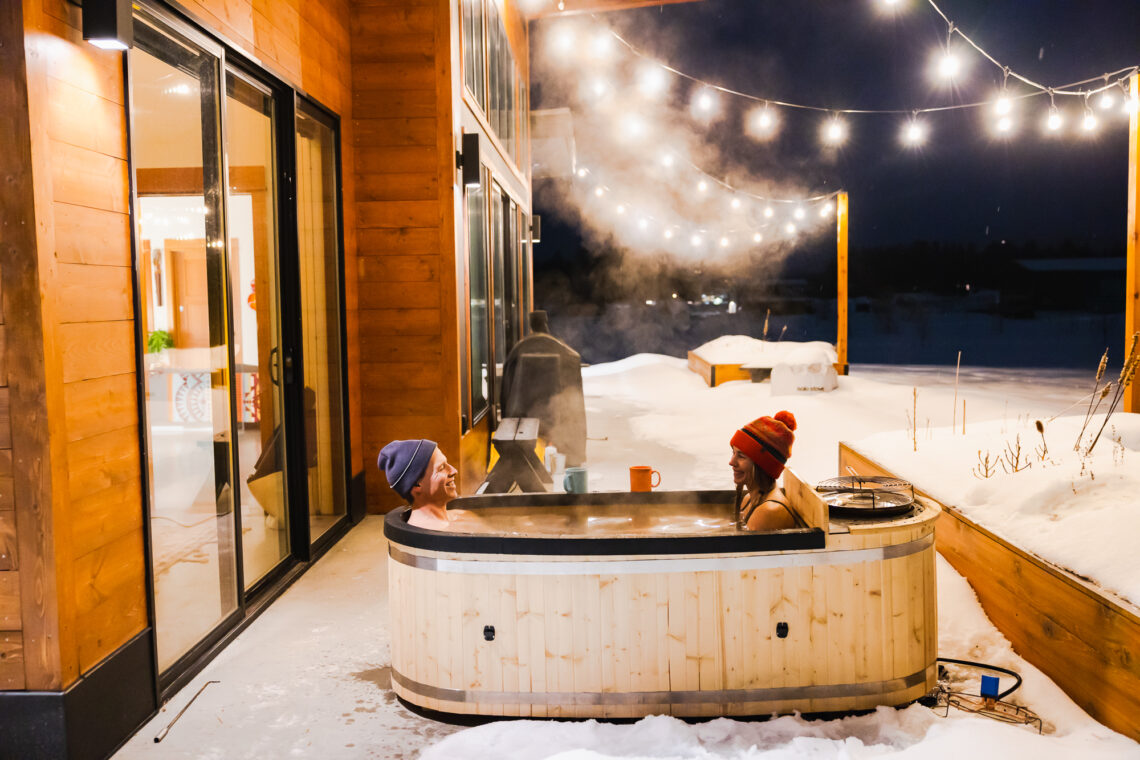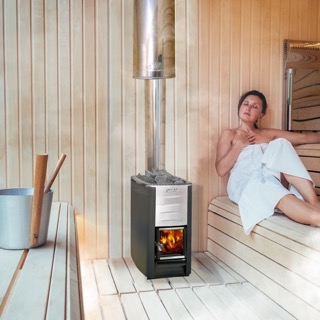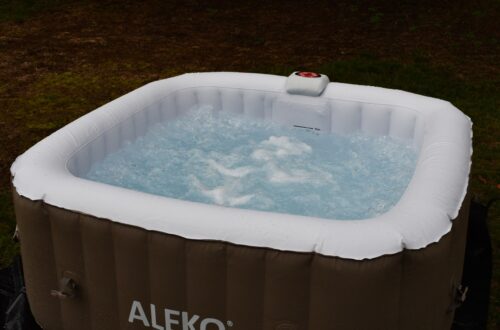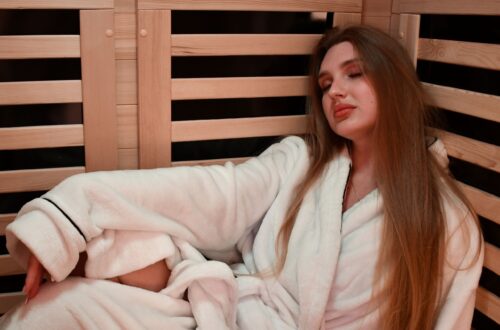If you’ve ever taken a dip in a hot tub, you probably know that there’s something undeniably soothing about ending a long, hard day with a good, long soak. But is there any science to back up the boost you get from unwinding in the tub?
As it turns out, there is. Hot tubs have been used as a form of hydrotherapy for years, and they’ve been linked to numerous observable health benefits. From finding pain relief to enjoying a better night’s sleep, those who swear by them know firsthand the various benefits of hot tub hydrotherapy.
For your perusing pleasure, we’ve narrowed down the top hot tub health benefits below. Come on in—the water’s fine.
#1 Muscle Relaxation
There’s a good reason why hot tubs are revered for being a classic “relaxation station.” Thanks to the combination of warm water and pulsating jets, hot tubs work to combat tight, sore muscles and joint pain.
Many hot tub owners rely on their home spa setups to:
- Decrease muscle stiffness – Soaking your body in warm water can increase blood flow to your muscles. This may help improve blood circulation and help loosen up tight muscles and lingering stiffness. If the hot water and bubbles aren’t enough, you can turn on the water jets for a hydrotherapeutic self-massage.
- Enhance workout routines – Thanks to increased blood flow, many hot tub users find that their range of motion has improved. A quick soak in the tub before or after a workout could improve your stretching capabilities and even help prevent injuries.
Give your body a chance to release muscle tension at the end of the day. You may find yourself feeling more refreshed and agile than ever.
#2 Stress Relief
One of the most well-known benefits of hot tubs is their ability to alleviate physical tension and feelings of stress.
While applying short-term heat can improve muscle function, prolonged exposure to warm waters can influence your brain chemistry in two ways:
- Stress levels reduce as hot water increases body temperature, thus calming the nervous system.
- Heat exposure also releases endorphins like dopamine and serotonin, which help promote feelings of happiness, relaxation, and calm.
In other words, that “stress melting away” feeling you get from a decadent dip in a hot tub is rooted in biology: A healthy dose of endorphins can help you feel happier and more grounded throughout the day.

#3 Injury Recovery
We’ve already noted that soaking before working out can improve your range of motion. By practicing consistent soaks, you could also prevent muscle strain and exercise-induced injury.
Additionally, introducing a hot tub into your life may help you recover if you’re in rehabilitation from a physical injury. This is because warm water therapy and immersion can stimulate blood circulation. With increased oxygen flow, injured tissue in strained muscles or joints may be able to heal quicker and more effectively.
#4 Improved Heart Health
If focusing on your cardiovascular health is central to your wellness routine, hot tubs may make it even easier to prioritize.
This benefit has been known to physicians and researchers for decades—back in 2003, a preeminent study done by Andreas Michalsen explored the benefits that warm baths grant to those suffering from chronic heart failure. He concluded that thermal treatment can help improve symptoms, heart-rate response, and overall quality of life for patients.
As the theory goes, the warm water in hot tubs could improve overall heart health in three key ways:
- By improving overall circulation – Michalsen’s paper hypothesized that hot soaks could improve circulation by regulating heart rate and reducing blood pressure overall.
- By expediting toxin removal – The hot water in hot tubs causes us to sweat. Sweating helps the body eliminate excess waste and toxins through the pores. As a result, you may step out of the hot tub feeling refreshed, much like walking out of a sweaty cardio class or an indoor sauna. Learn more about the benefits of a sauna vs hot tub unit.
- By soothing anxiety – Hot tubs help reduce stress throughout our bodies. By relieving tension in our muscles and minds, the whole body (including the heart) can relax. By decreasing anxiety levels, we’re also enabling deep breathing and slowing our pulse.
Protecting your heart health remains one of the most important things you can do not only to promote longevity but also to ensure you enjoy a long, stress-free life.
#5 Pain Relief
Among the many benefits of a hot tub, pain relief remains one of the most sought-after. Many people who suffer from musculoskeletal conditions will implement hot tub use into their routines to help alleviate pain.
Hydrotherapy lessens gravity’s effects, relieves joint pressure, reduces excess swelling, and improves blood flow throughout the body.
For this reason, hot tubs remain popular pain relief solutions for those who suffer from:
- Arthritis
- Chronic pain
- Fibromyalgia
- Back pain
- Edema
#6 Higher Sleep Quality
Some hot tub benefits extend beyond your waking life. With the boost of relaxation from a hot tub, you may sleep more soundly at night.
Many experts believe that a warm soak before bed can help you drift off to sleep faster. In fact, a warm bath before bed is a common practice in Japan.
So not only can hot tubs act as a natural sleep aid, but they can also allow you to reap the benefits of restful sleep. The U.S. Department of Health and Human Services reports that healthy sleeping habits can lead to:
- Improved mood
- Sharpened focus
- Improved immune system function
- Reduced stress
In other words? If you’re anxious to ditch the melatonin and opt for a more natural solution, keeping a steamy tub in your backyard could be just the thing to help you nod off in no time.
#7 Fun and Entertainment
Hot tubs have notorious health benefits, but let’s not ignore one of the most obvious benefits of a hot tub: they’re fun.
Whether you’re entertaining neighbors, children, or in-laws, hot tubs are a nearly universally enjoyable activity. They’re suitable for people of all ages, and physical abilities, and no matter what climate you live in, you’ll rarely find seasonal restrictions on taking a soak.
With its easy-to-use features and weather adaptability, you can make your hot tub a centerpiece of occasions like:
- Movie night – Make room for the whole family in the tub and throw a movie on a projector screen. Enjoy the family fun atmosphere while enjoying the jets’ soothing feel.
- Neighborhood barbeque – Invite your friends for a summertime soak in the tub. Whether you’re celebrating the Fourth of July or the long-awaited arrival of the weekend, turning on the hot tub can turn any day into a party.
- Romantic date night – Switch on the jets and ramp up the outdoor mood lighting for a romantic evening with your partner. You can stay warm while stargazing, talking through the night, and layering up on bubbles with two flutes of champagne.
Human beings are social animals, and we’ve been gathering waterside to shore up our connections throughout time. With excellent benefits for health, mood, and our sense of belonging, hot tubs are an incredible way to create memories you’ll cherish for a lifetime.
But, how much is a hot tub, and is it worth the purchase? While a hot tub can be a stealthy investment, it serves many year-round benefits and relaxation.
Who Should Not Use a Hot Tub?
Being a responsible hot tub owner means being aware of the dos and don’ts of hot tub use. Though you may love taking a daily soak in your “relaxation station,” it’s important to be mindful of some select circumstances that could pose potential risks for others.
You (or any guests you invite over) should avoid getting into a hot tub if:
- You’re pregnant – Getting into a hot tub when pregnant can lead to quick overheating and potentially harm the baby.
- You have low blood pressure – Hot tubs boast circulation benefits because they tend to regulate and slow blood pressure. To that end, they may not be suitable for people with low blood pressure. If you decide to go in, be sure to limit the amount of time spent inside. Lengthy soaks may lead to lightheadedness or even fainting.
- You have a UTI – Urinary tract infections (UTIs) and hot water do not mix. Hot tubs could potentially lead to irritation or even worsen your symptoms. If you’re working through a UTI and still want to join in on the fun, try dipping your feet in the water instead. A nice, long foot bath can work wonders for relaxation, too.
Still unsure if you can take a dip safely? It never hurts to contact a trusted doctor or physician if you’re unsure whether a hot tub could aggravate your health concerns. It’s always best to practice caution and do what’s best for your body.

Build Your Relaxation Station with ALEKO
If you’ve been waiting for a sign to get the hot tub of your dreams, you’ve found it. Hot tubs provide a fun, relaxing atmosphere for your family and friends and can better your long-term health. Whether you’re aiming for consistent sleep, pain relief, or a simple mood booster, a hot tub can help with all that and more.
At ALEKO, we know just how transformative hot tubs can be for making the most of life and health. Whether you want to turn your backyard into a spiritual sanctuary or the neighborhood’s go-to barbecue spot, we’ve got you covered. Start creating a getaway in your own backyard by exploring hot tubs, metal fence options, outdoor awnings, and more with ALEKO.
Sources:
Hydrotherapy: What it is, benefits & uses. Cleveland Clinic. (n.d.). Retrieved November 8, 2022, from https://my.clevelandclinic.org/health/treatments/23137-hydrotherapy
Preisinger, E, and M Quittan. [Thermo- and Hydrotherapy]. Wiener medizinische Wochenschrift (1946). Retrieved November 8, 2022, from https://pubmed.ncbi.nlm.nih.gov/7879403/
Austin, D. (2021, August 31). Looking to improve your mood and sleep better? experts say to take more baths. USA Today. Retrieved November 8, 2022, from https://www.usatoday.com/story/life/health-wellness/2021/08/31/bath-benefits-soaking-tub-can-improve-physical-mental-health/5616904001/
Michalsen A;Lüdtke R;Bühring M;Spahn G;Langhorst J;Dobos GJ; (n.d.). Thermal hydrotherapy improves quality of life and hemodynamic function in patients with chronic heart failure. American heart journal. Retrieved November 8, 2022, from https://pubmed.ncbi.nlm.nih.gov/14564334/
Tochihara, Y. (2022, February 15). A review of Japanese-style bathing: Its demerits and merits. Journal of physiological anthropology. Retrieved November 8, 2022, from https://www.ncbi.nlm.nih.gov/pmc/articles/PMC8848820/
Get enough sleep. Get Enough Sleep – MyHealthfinder. (n.d.). Retrieved November 8, 2022, from https://health.gov/myhealthfinder/healthy-living/mental-health-and-relationships/get-enough-sleep






